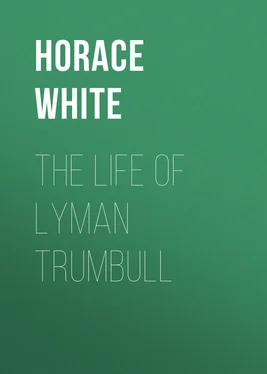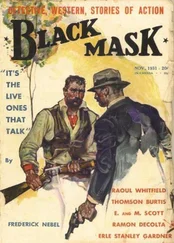Horace White - The Life of Lyman Trumbull
Здесь есть возможность читать онлайн «Horace White - The Life of Lyman Trumbull» — ознакомительный отрывок электронной книги совершенно бесплатно, а после прочтения отрывка купить полную версию. В некоторых случаях можно слушать аудио, скачать через торрент в формате fb2 и присутствует краткое содержание. Жанр: foreign_prose, История, foreign_edu, foreign_antique, на английском языке. Описание произведения, (предисловие) а так же отзывы посетителей доступны на портале библиотеки ЛибКат.
- Название:The Life of Lyman Trumbull
- Автор:
- Жанр:
- Год:неизвестен
- ISBN:нет данных
- Рейтинг книги:5 / 5. Голосов: 1
-
Избранное:Добавить в избранное
- Отзывы:
-
Ваша оценка:
- 100
- 1
- 2
- 3
- 4
- 5
The Life of Lyman Trumbull: краткое содержание, описание и аннотация
Предлагаем к чтению аннотацию, описание, краткое содержание или предисловие (зависит от того, что написал сам автор книги «The Life of Lyman Trumbull»). Если вы не нашли необходимую информацию о книге — напишите в комментариях, мы постараемся отыскать её.
The Life of Lyman Trumbull — читать онлайн ознакомительный отрывок
Ниже представлен текст книги, разбитый по страницам. Система сохранения места последней прочитанной страницы, позволяет с удобством читать онлайн бесплатно книгу «The Life of Lyman Trumbull», без необходимости каждый раз заново искать на чём Вы остановились. Поставьте закладку, и сможете в любой момент перейти на страницу, на которой закончили чтение.
Интервал:
Закладка:
Here was a double sophistry: First, the implication that, if the Emigrant Aid Company had boldly avowed that its purpose was to control the domestic institutions of Kansas and bring it into the Union as a free state, its heinousness would have been plain to all; second, that the Constitution of the United States, and the organic act of the territory itself, guaranteed the people against such an outrage. But the declared object of the Nebraska Bill was to allow the people to do this very thing by a majority vote. Mr. Trumbull brought his flail down upon this pair of sophisms with resounding force. In debate with Senator Hale, a few days earlier, Toombs, of Georgia, had had the manliness to say:
With reference to that portion of the Senator's argument justifying the Emigrant Aid Societies,—whatever may be their policy, whatever may be the tendency of that policy to produce strife,—if they simply aid emigrants from Massachusetts to go to Kansas and to become citizens of that territory, I am prepared to say that they violate no law; and they had a right to do it; and every attempt to prevent them from doing so violated the law and ought not to be sustained. 22
By way of justifying the Border Ruffians the report said that when the emigrants from New England were going through Missouri, the violence of their language and behavior excited apprehensions that their object was to "abolitionize Kansas as a means of prosecuting a relentless warfare on the institution of slavery within the limits of Missouri."
What! [said Trumbull,] abolitionize Kansas! It was said on all sides of the Senate Chamber (when the Nebraska bill was pending) that it was never meant to have slavery go into Kansas. What is meant, then, by abolitionizing Kansas? Is it abolitionizing a territory already free, and which was never meant to be anything but free, for Free State men to settle in it? I cannot understand the force of such language. But they were to abolitionize Kansas, according to this report, and for what purpose? As a means for prosecuting a relentless warfare on the institution of slavery within the limits of Missouri. Where is the evidence of such a design? I would like to see it. It is not in this report, and if it exists I will go as far as the gentleman to put it down. I will neither tolerate nor countenance by my action here or elsewhere any society which is resorting to means for prosecuting a relentless warfare upon the institution of slavery within the limits of Missouri or any other state. But there is not a particle of evidence of any such intention in the document which professes to set forth the acts of the Emigrant Aid Society, and which is incorporated in this report. 23
Trumbull next took up the contention of the report that since Governor Reeder had recognized the usurping legislature, he and all other governmental authorities were estopped from inquiring into its validity. No great effort of a trained legal mind was required to overthrow that pretension. Trumbull demolished it thoroughly. After giving a calm and lucid sketch of the existing condition of affairs in the territory, Trumbull brought his speech to a conclusion. It fills six pages of the Congressional Globe . 24
This was the prelude to a hot debate with Douglas, who immediately took the floor. Trumbull had remarked in the course of his speech that the only political party with which he had ever had any affiliations was the Democratic. Douglas said that he should make a reply to his colleague's speech as soon as it should be printed in the Globe , but that he wished to take notice now of the statement that Trumbull claimed to be a Democrat. This, he said, would be considered by every Democrat in Illinois as a libel upon the party.
Senator Crittenden called Douglas to order for using the word "libel," which he said was unparliamentary, being equivalent to the word "lie." Douglas insisted that he had not imputed untruth to his colleague, but had only said that all the Democrats in Illinois would impute it to him when they should read his speech. He then went into a general tirade about "Black Republicans," "Know-Nothings," and "Abolitionists," who, he said, had joined in making Trumbull a Senator, from which it was evident that he was one of the same tribe, and not a Democrat. So far as the people of Illinois were concerned, he said that his colleague did not dare to go before them and take his chances in a general election, for he (Douglas) had met him at Salem, Marion County, in the summer of 1855, and had told him in the presence of thousands of people that, differing as they did, they ought not both to represent the State at the same time. Therefore, he proposed that they should both sign a paper resigning their seats and appeal to the people, "and if I did not beat him now with his Know-Nothingism, Abolitionism, and all other isms by a majority of twenty thousand votes, he should take the seat without the trouble of a contest."
Neither Trumbull nor Douglas was gifted with the sense of humor, but Trumbull turned the laugh on his antagonist by his comments on the coolness of the proposal that both Senators should resign their seats, which Governor Matteson would have the right to fill immediately, and which the people could in no event fill by a majority vote, since the people did not elect Senators under our system of government. The reason why he did not answer the challenge at Salem was that his colleague did not stay to hear the answer. After he had finished his speech it was very convenient for him to be absent. "He cut immediately for his tavern without waiting to hear me." Trumbull denominated the challenge "a bald clap-trap declamation and nothing else."
Douglas's charges about Know-Nothings and Abolitionists were well calculated to make an impression in southern Illinois; hence Trumbull did not choose to let them go unanswered. His reply was pitched upon a higher plane, however, than his antagonist's tirade. He said:
In my part of the state there are no Know-Nothing organizations of whose members I have any knowledge. If they exist, they exist secretly. There are no open avowed ones among us. These general charges, as to matters of opinion, amount to but very little. It is altogether probable that the gentleman and myself will differ in opinion not only upon this slavery question, but also as to the sentiments of the people of Illinois. The views which I entertain are honest ones; they are the sincere sentiments of my heart. I will not say that the views which he entertains in reference to those matters are not equally honest. I impute no such thing as insincerity to any Senator. Claiming for myself to be honest and sincere, I am willing to award to others the same sincerity that I claim for myself. As to what views other men in Illinois may entertain we may honestly differ. The views of the members of the legislature may be ascertained from their votes on resolutions before them. I do not know how to ascertain them in any other way. As for Abolitionists I do not know one in our state—one who wishes to interfere with slavery in the states. I have not the acquaintance of any of that class. There are thousands who oppose the breaking-down of a compromise set up by our fathers to prevent the extension of slavery, and I know that the gentleman himself once uttered on this floor the sentiment that he did not know a man who wished to extend slavery to a free territory.
Douglas replied at length to Trumbull on the 20th of March, in his most slippery and misleading style. If it were possible to admire the kind of argument which makes the worse appear the better reason, this speech would take high rank. It may be worth while to give a single sample. Trumbull had said that in his opinion the words of the Missouri Compromise, prohibiting slavery in certain territories "forever," meant until the territory should be admitted into the Union as a state on terms of equality with the other states. Douglas seized upon this as a fatal admission, and asked why, if "forever" meant only a few years, Trumbull and all his allies had been abusing him for repealing the sacred compact.
Читать дальшеИнтервал:
Закладка:
Похожие книги на «The Life of Lyman Trumbull»
Представляем Вашему вниманию похожие книги на «The Life of Lyman Trumbull» списком для выбора. Мы отобрали схожую по названию и смыслу литературу в надежде предоставить читателям больше вариантов отыскать новые, интересные, ещё непрочитанные произведения.
Обсуждение, отзывы о книге «The Life of Lyman Trumbull» и просто собственные мнения читателей. Оставьте ваши комментарии, напишите, что Вы думаете о произведении, его смысле или главных героях. Укажите что конкретно понравилось, а что нет, и почему Вы так считаете.












